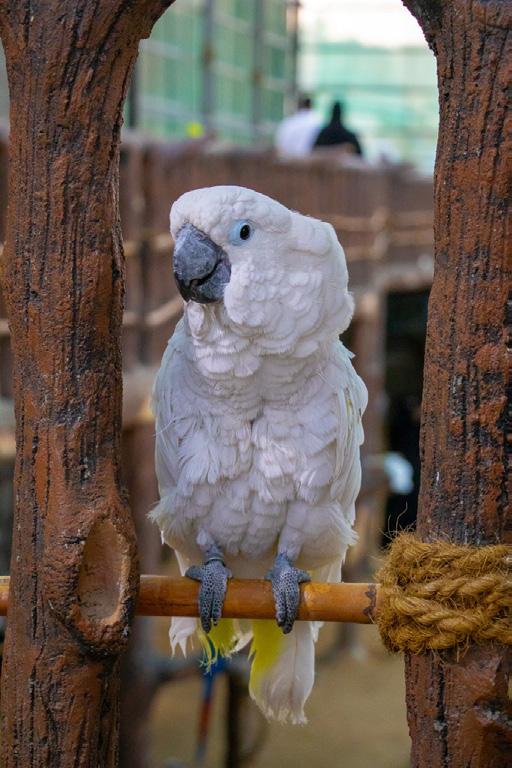
3 minute read
NASA Scientist, Dr. Soliman, on a mission to explore the beginning of the universe through the BICEP Array
byMohammedIbrahimMohammed
Have you ever wanted to know how the universe came to be? Well, we at the SAMIS Chronicle certainly had the opportunity to know a glimpse of it! We had the privilege to interview Dr. Ahmed Mohamed Soliman straight from the South Pole and ask him some of our burning questions regarding his mission and personal achievements.
Advertisement
Dr. Ahmed Mohamed Soliman is an Egyptian scientist and engineer working at the California Institute of Technology (Caltech) and the National Aeronautics Space Administration (NASA). He was chosen to go on a mission with a select group of specialized scientists from NASA to the South Pole. He stayed at Amundsen Scott South Pole Station for a few months researching the origins of the universe.
Exploring the Beginning of Universe and Galaxy Formation
Can you tell us about the nature of your mission and what is its importance?
We are building a big telescope at the South Pole, it’s well known worldwide as the “BICEP (Background Imaging of Cosmic Extragalactic Polarization) Array”, a Cosmic Microwave Background (CMB) experiment to measure the inflationary gravitational wave that would be imprinted on the CMB. This is the oldest light in the universe, about 13.8 years old. It was expected to be generated when the universe was about 0.0000000000001 second-old and it travels all the way to us. This wave contains a wealth of information about the origin of the universe and what happened to the newborn universe during the first moments after the big bang. We are a collaboration team from Caltech/JPL-Nasa, Harvard University, Stanford University, and the University of Minnesota. I am really honored to be a member of the Caltech/JPL-NASA team.
How does your work affect humanity as a whole?
It will positively affect humanity since we are trying to answer one of the oldest questions ever, “How did our universe begin?”. This will also answer other questions, like “how did the first atom formed in the beginning”, “Is there a parallel universe and we don’t know anything about it?” …. And many others. Knowing the beginning of the universe will help us understand its current situation and expect what will happen in the future.
Can you tell us about the James Webb telescope, and how it may affect your research?
In simple words, the James Webb telescope is going to take pictures of the very far areas of the universe that we couldn’t reach using our groundbased telescopes. On the other hand, we are trying to answer the puzzle question which is how all of these things in the universe begin 13.8 billion years ago. So, I think we are helping each other to better understand our universe.
Can you tell us something about wormholes and the probability of their existence?
It was expected by Einstein, but it hasn’t been detected by any experiment yet.
Can you quickly explain the “sun halo” and the “sun dog” phenomenon?
It’s an optical phenomenon that happens at the South Pole and other places due to the reflections and diffraction of the sun’s light on the ice crystals in the atmosphere.
Achievement as Crowning Glory of Endeavors
How did you adapt to changes from Egypt to America, then to the South Pole?
The answer needs a few pages to describe the challenges I had during my journey and the ways to overcome and adapt to these challenges. I would just advise [you] to listen to others and educate yourself.
What was the hardest part of your academic education?
I think there is no hard part if you enjoy what you are doing even if it’s very difficult.
How did you adapt to the extreme weather of the Antarctic region?
It was very hard to adapt in the beginning, especially when it reaches below -40o C. We received special clothes to help us, but this extremely cold weather still could cause frostbite to our fingers by freezing the skin and underlying tissues. It slightly happened to me once and I luckily received the medical care.
Who do you look up to in life? And who do you look up to in scientific study?
Not a single person. My family for supporting me. My parent for their deep faith. Dr. Zewail for his beautiful dreams and achievements. Dr. Kip Thorne for his beautiful science work in Hollywood. Dr. Mostafa El-Sayed for his amazing work in science... etc.

What is a good piece of advice for young adults trying to succeed in scientific fields like you?
Work hard and smart toward your dreams and always believe in God in your heart that you can do whatever you dream of and YOU WILL. Yes, I mean it!









